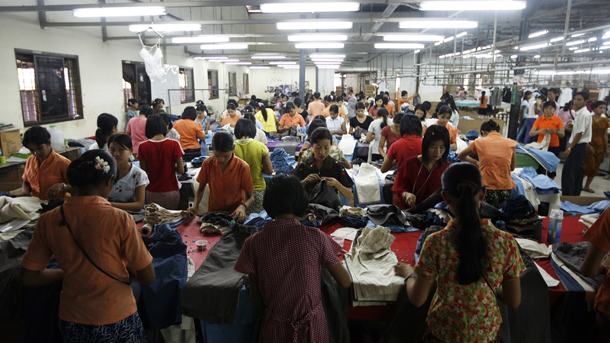Forty-five steelworkers have continued their hunger strike for a third day at Yangon Crown Steel Factory in Myauntakar Industrial Zone in Rangoon’s Hmawbi Township as representatives of the workers entered into talks on Monday with the factory manager and Director General of the Worker Supervisory Office Win Shein.
In addition to the hunger strikers, some 400 workers out of a factory staff of 700 are on strike for a ninth consecutive day in protest at refused wage demands.
“Forty-five men are on hunger strike for a third day,” said labor activist Kyaw Wunna. “Of that number, seven men have collapsed and one has been hospitalized.”
On Friday, 25 men went on hunger strike when the factory owner refused to meet workers’ demands for increased pay. Workers at the steel factory earn a basic wage of 160 kyat (less than US $0.20) a day. The 25 were joined by an additional 20 men over the weekend. Monthly incomes, including overtime and various allowances, range from 4,500 to 10,000 kyat ($5.35 to $12). The workers are demanding an increase to a minimum daily wage of 1,600 kyat across the board.
“The hunger strikers said they will stop when the salary demands are met,” said Kyaw Wunna.
Well-known Buddhist monk Shwe Nya War Sayadaw U Pinnyasiha has been providing lunch and dinner for the remaining strikers at Myauntakar factory, as well as at a factory in Taikkyi, in northern Rangoon Division, where several hundred workers are also on strike demanding wage increases from the South Korean-owned EMG garment factory.
Speaking to The Irrawaddy, Sayadaw U Pinnyasiha said, “I have urged the men to stop the hunger strike, but they are strong willed and are continuing.”
In the meantime, workers’ strikes have apparently gained momentum and spread to factories in Hlaing Tharyar, Shwepyithar, Hmawbi and Taikkyi.
However, factory workers resumed work over the weekend at seven Rangoon factories: Toe Myat Aung knitting factory; YJ [garments]; Nay Min Aung [garments]; Pearl [garments]; Asia Rose [garments]; Sapae Pwint Garment Factory; and Miss Tai shoe factory—which are owned by either South Korean, Chinese or Japanese firms.
U Htay, a lawyer acting as consultant for the workers, said, “The employees [at the seven factories] had to go back to work because they cannot survive any longer, and need to support their families.”
On the other hand, Hi Mo wig factory workers said they will continue strike action until their demands are met despite some strikers suffering from health problems.
Myo Aung, the director-general of Naypyidaw’s Labour Registration Department, met with Hi Mo workers and their representatives on Monday.
Thida Htun, a female employee at Hi Mo factory, told The Irrawaddy on Monday afternoon that no agreement has yet been reached.
“We want our salaries increased as per the agreement we made three weeks ago,” she added.
She said that the director-general had handed the workers’ representatives a form letter to fill in which would address their concerns.
“We will submit this letter to five departments, including the Labour Office,” Thida Htun said. “And we hope that they will honour the agreement [to increase salaries to 30,000 kyat per month] which was made three weeks ago.”

















